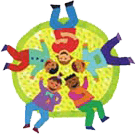Navigating Intense Emotions
As if life wasn’t complex enough to navigate, 2020 has thrown us into a tailspin with one unknown after another. These certainly are unprecedented times. It’s no wonder our emotions feel so amplified and agitated, while our ability to cope feels diminished. It can be helpful to understand why we feel the way we do and what actions we can take to help us better manage.
We feel anxious and a range of intense emotions for different reasons.
Unknowns without concrete information can trigger our brains to catastrophize based on fear. We might ask ourselves, ‘When will this be over?’ Will schools re-open, when? When can I hug my loved ones again?
Novel experiences can contribute to amplified emotions. Hello virtual learning! Also, we have never experienced times like these in our lifetime. For example, we don’t have first-hand knowledge as to how to deal with this kind of global pandemic and don’t know what to expect.
Feelings of confinement and loss are other reasons for experiencing intense emotions. We may feel like we have cabin fever due to our former ‘go-to’ places being cut off to us or severely restricted. As a result, many of us are spending much more time than usual with loved ones and housemates, without our outside-of-home jobs, friends to visit, or gyms to exercise. This excessive time together, combined with the loss of our ‘away’ time and natural breaks in our schedules may feel unnatural, cause us to feel edgier, and be reactive to those in our household. Additionally, many of us have struggled with other kinds of loss such as a regular job, income, in-person social connections, and loved ones.
The news and social media can add to intense and crazed feelings with us ruminating around the barrage of information from repetitive news cycles. The presentation of the news from varying media sources of stories that differ, recap, and preach gloom and doom, can be dramatic, scary, and contribute to feelings of helplessness.
Remember, we all process and deal with circumstances in different ways. You may be experiencing a plethora of different emotions, reactions, and even physical symptoms. Be patient with yourself and with others who may have different perspectives, we are all in this together.
Some common emotions, reactions, and symptoms include:
- Feelings of grief and loss
- Sadness, helplessness, and hopelessness
- Anger, anxiety, fear, panic, and hypervigilance
- Increased crying, agitation, irritability, and heightened startle response
- Socially isolating
- Difficulty concentrating or feeling confused
- Negative thinking and low self-esteem/self-worth
- Gastrointestinal issues, headaches, and insomnia
- Decreased effectiveness of anxiety or mood medications
What can we do to help?
Even when we can’t control an outcome or the unknowns, we can still work on being in control of ourselves and learn to respond rather than react.
Some self-care strategies are:
- Limit time on social media and reading/watching the news.
- Make time to safely ‘connect’ with friends and family.
- Seek therapy to deal with personal obstacles and emotional issues.
- Honor ‘alone time’ and personal boundaries.
- Keep up regular sleep and take care of personal hygiene.
- Eat a well-balanced diet and stay hydrated.
- Movement – try yoga, family dance, or walk/run time.
- Practice deep breathing techniques and engaging your senses (pleasant smells, take a bath, listen to relaxing music, nature hike, etc.).
- Maintain your spiritual connection – whatever that means for you.
- Practice mindfulness: attempting to stay in the ‘alive present/here and now’ (quiet the restless mind).
- Journaling can be a good practice to get the thoughts out of your head and onto the written page, providing perspective and relief.
Strategies for Kids:
- Rhythmic and sensory-motor movement activities can be calming for kids.
- Keeping your kids on a ‘schedule’ by structuring daily activities that involve their school work, interests, physical movement, and household chores.
- Introducing calming experiences through play and the practicing of relaxation games (i.e., program for children and anxiety on ‘GoZen’).
- Looking at pictures of baby animals can be uplifting and calming.
Journaling or drawing pictures can also be used with children, help your kids explore their thoughts, feelings, or other experiences.
In addition to practicing strategies to feel more in control, we can implement strategies to help shift our moods.
Mood lifters:
- Embrace humor, laughter, and comedy.
- Play and listen to music.
- Watch movies & documentaries that are uplifting to you.
- Be creative and make art (drawing, collages, painting).
- Spend time with pets; take them out for a daily dose of sunshine.
- Engage in regular cardio-type exercise to raise endorphins.
- Implement a daily individual or family gratitude/appreciation/celebration practice: What are you thankful for?
- Meditation: including breath awareness and quieting the overactive mind. Helpful Apps include:
- Insight Timer search for “Learn to Meditate in 7 Days;” and world renowned teachers, Tara Brach and Jack Kornfield.
- Headspace (free for L.A. County residents). Meditation, deep breathing, movement, and sleep guidance and support.
- CALM
Sometimes the strength
within you is not a big fiery
flame for all to see; it is just a
tiny spark that whispers softly,
You’ve got this, keep going.’
-UNKNOWN-
Melinda S. Martinez, MA, LMFTMelinda Martinez has nearly 20 years of experience working with individuals and their families, including those with ASD and other developmental disabilities. In her work with clients, she focuses on supporting individual differences and helping families strengthen relationships. Melinda also has extensive experience with DIRFloortime®. At VHAP, Melinda provides case supervision, parent training and staff trainings.
